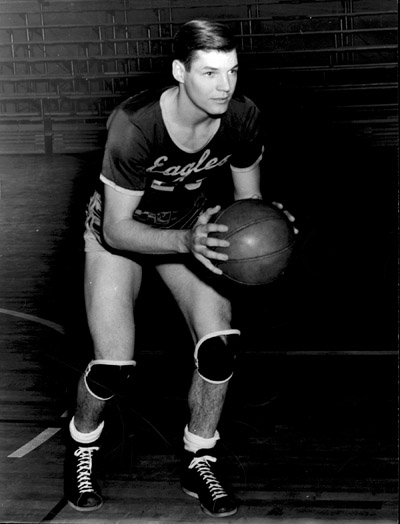
Morris Harvey basketball star George King played
for the Golden Eagles from 1946-50, setting several national and school
scoring records. Photograph courtesy of University of Charleston, Morris
Harvey Archives, date unknown
Top Score
Morris Harvey’s George King
By Bob Kuska
Before his death in 2006, George King often chuckled whenever he reflected on his storybook basketball career at Charleston’s Morris Harvey College. Then, in a slightly hushed, confiding tone, he added, “When I stop and think of all the points that I scored, I can hardly believe it. My dad wasn’t an athlete. Neither were my siblings great athletes, as such. I don’t know where it came from. I really don’t.”
King scored a total of 2,495 points at Morris Harvey, falling 23 points shy of the national intercollegiate four year career scoring record. In 1949 and 1950, King led the nation in scoring with 29.1 and 31.2 point per game averages, respectively. The latter figure made him the first player in the history of college basketball to average 30 points, or more, per game.
King’s was a storybook career that almost never happened. After graduating in the spring of 1946 from Stonewall Jackson High School, where he was a good but not great gym rat, George reluctantly quit the sport and enrolled at Marshall College. “I was only about 5'7" in high school, and I didn’t have any scholarship offers,” said George, the youngest child of a traveling hardware salesman. “I decided that I was just too small to keep playing.”
Then, shortly before leaving for Marshall, the phone rang at his home. On the other end was the booming voice of Eddie King, the new basketball coach at Morris Harvey College, no relation to George. “Eddie said he wanted to talk about me coming to Morris Harvey on a scholarship,” George recalled. “My eyes opened real wide, and I thought, ‘What is this all about?’”
As George would learn later, the phone call was placed out of necessity more than true interest. Coach King had been recruiting George’s taller high school teammate Bill Jarrett, and Jarrett had been reluctant to commit to the college. Jarrett finally acquiesced but with one stipulation: His high school buddy George King would need a basketball scholarship, too.
Coach King, a barrel chested former college football lineman who also had a brief run as a middleweight boxer, told George that the offer on the table was free tuition. But there was a catch: To reimburse the college for the roughly $150 tuition waiver, George had to serve as one of the lowly managers of the football team. George didn’t think twice.
Two weeks later, the kid who would earn the campus nickname “Lil’ Abner” for his likeness to the happy go lucky comic-strip character was straddling the sidelines, spit bucket in hand and a white towel draped over his shoulder. King had grown about four inches since high school and stood a more respectable six feet. He also had pushed himself at the Charleston YMCA, improving his quickness, refining his ballhandling skills, and becoming a better all around player than Jarrett, who quit after less than two seasons at Morris Harvey.
When basketball practice began in the fall of 1946, Coach King immediately noticed George’s new and improved court game, penciled him into the starting lineup alongside four older war veterans, and his star freshman’s baptism-by-fire began.
“I’ll never forget in one of my first games, I started to make a cut to the basket and my defender punched me in the stomach,” said George. “The guy doubled me right over, and we had to call a timeout. I made it over to the bench and said to my teammates, ‘That guy just busted me with his fist.’ The old timers the big war heroes just looked at me and said, ‘Hey, boy, we’ve got our own problems. You’ve got to take care of yourself.’”
You can read the rest of this article in this issue of Goldenseal, available in bookstores, libraries or direct from Goldenseal.